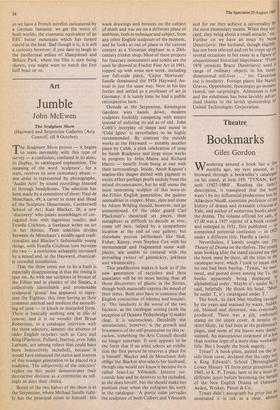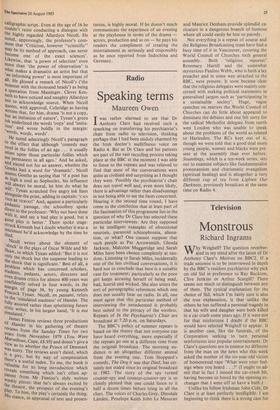Theatre
Bookmarks
Giles Gordon
Wandering around a book fair a felt months ago, my eyes paused, as I browsed through a bookseller's catalogue on his stand, at item 193: 'TYNAN, Ken' neth (1927-1980)'. Reading the item's description, it transpired that the book wasn't by my influential predecessor but by Allardyce Nicoll, sometime professor of the history of drama and dramatic criticism at Yale, and author of numerous books about the drama. The volume offered for sale, at £7.00 was a 1937 reprint of a book revisal and enlarged in 1931, first published — to compound potential confusion — in 1923 under a different title. Hardly a rarity. Nevertheless, I keenly sought out The Theory of Drama on the shelves. The young man looking after the stand assured me that the book must be there, all the titles in the catalogue were; which I took to mean that no one had been buying. 'Tynan,' he mut- tered, and peered down among the Ts, the books apparently being displayed In alphabetical order. 'Maybe it's under N,' , said, helpfully. He shook his head. 'Mug be under T, it's catalogued under T.' , The book, its dark blue binding ravaged by the years and maimed by water, bubhl' ed, bloated and distorted, was eventually produced. There was a gilt, embossed stamp on the upper cover. A termite or, more likely, rat had been at the preliminarY pages, and some of the leaves were darnP" stained. An inauspicious treatment of a less than routine copy of a more than workaday title. But I bought the book eagerly. Tynan? A book-plate, pasted on the in' side front cover, declared that the copy was a King Edward's School [Birminghaul.1 Lower History VI form prize presented, to 1943, to K. P. Tynan, later to be a most Iry different actor before becoming the herald of the New English Drama of Osborne, Arden, Wesker, Pinter & Co. Tynan didn't autograph his prize but he annotated it in ink in a clear, almost calligraphic script. Even at the age of 16 he couldn't resist conducting a dialogue with the highly regarded Allardyce Nicoll. He noted, approvingly, the professor's com- ment that 'Criticism, however "scientific" may be its method of approach, can never become one of the exact sciences'. Likewise, that 'a power of selection' even more than 'the power of observation' is what makes a dramatist an artist but that an informing power' is most important of all. He glossed a remark of Nicoll's ('the Monster with the thousand heads') as being quotation from Massinger. Clever Ken- neth to have noticed and naughty Allardyce not to acknowledge source. When Nicoll quotes, with approval, Coleridge as having Written that, for him, drama 'is not a copy, but an imitation of nature', Tynan's green ink underlined the words 'copy' and 'imita- tion, and wrote boldly in the margin: Words, words, words'. He noted admiringly Nicoll's paragraph to the effect that although 'comedy may revel in the follies of an age ... it usually seizes upon those particular follies which are permanent in all ages.' And he asked, and stayed not for an answer, whether the Greeks had a word for 'dramatic'. Nicoll (litotes Goethe as saying that 'if a poet has as high a soul as Sophocles, his influence Will always be moral, let him do what he Will'. Tynan scratched five angry ink lines alongside the print, adding in capitals: 'CAN THIS BE TEROOr And, against a particularly Pedantic passage, the schoolboy spoke direct to the professor: 'Why not have done with it, and say a bad play is good, but a 800d play is better.' There spoke stage- struck Kenneth but I doubt whether it was a sentiment he'd acknowledge by the time he died.
Nicoll writes about the element of shock' in the plays of Oscar Wilde and Mr Shaw, to which Tynan added: 'But it is not c'nlY the shock but the suspense leading to the shock that is significant.' Best of all, a Problem which has concerned scholars, students, pedants, actors, directors and even drama critics for almost 400 years was confidently solved in four words, in the margin of page 36, by young Kenneth Peacock Tynan. Nicoll, en passant, refers ty the 'simulated madness' of Hamlet. The fully assured rather than spluttering future critic writes, in his largest hand, 'It is not simulated.'
James Fenton reviews three productions
Hamlet in his gathering of theatre reviews from the Sunday Times for two Years from November 1979 (You Were Marvellous, Cape, £8.95) and doesn't give a view as to whether the Prince of Denmark Was nutty. The reviews aren't dated, which is a pity, but by way of compensation there's a useful index. To me, the book is valuable for its long introduction which reveals something which isn't often ap- Parent from Mr Fenton's slyly written weekly pieces: that he's always excited by the theatre, the prospect of the evening's Play. To him, the play's certainly the thing. His stance, in appraisal of text and presen-
tation, is highly moral. II' he doesn't much communicate the experience of an evening at the playhouse in terms of the drama actors, production and so on — he pays his readers the compliment of treating the entertainment as seriously and responsibly as he once reported from Indochina and Germany.



































 Previous page
Previous page